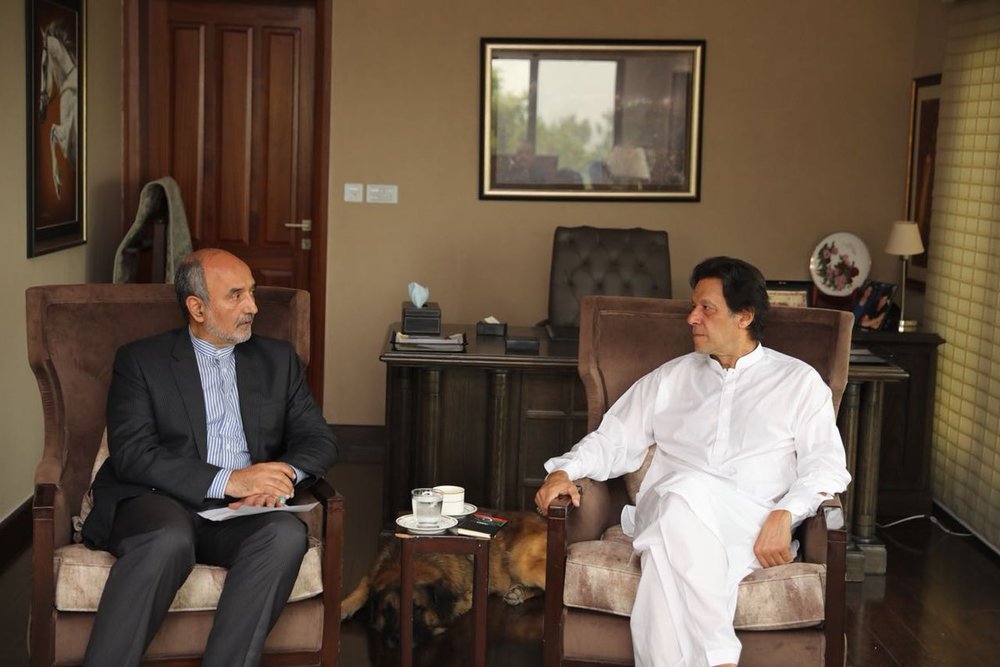Will Pakistan, Iran open new chapter in their relationship?

TEHRAN - As Pakistan Tehreek Insaaf (PTI) chief Imran Khan gets ready to take oath as the new prime minister of Pakistan, pundits are keen to see what his foreign policy will be. A populist leader, his election campaign focused majorly on domestic issues and the fight against institutional corruption.
But, in his televised victory speech, the cricketer-turned-politician outlined his vision for ‘Naya Pakistan’ (new Pakistan) and spoke in detail about his desire to improve Pakistan’s relations with neighboring countries, including Iran.
Pakistan, which has traditionally been an ally of Riyadh, is expected to open a new chapter in its relations with Iran under the new government in Islamabad. Khan, whose party had backed the 2015 Iran nuclear deal, has been outspoken in his support for Tehran. More importantly, he has been scathing in his criticism of the U.S. government’s regional policy and travel ban on the citizens of some Muslim-majority countries, including Iran.
It will be interesting to see how Khan, who has been a staunch votary of stronger Iran-Pakistan ties, balances the equation between Riyadh and Tehran, two formidable regional rivals. Also, how he will resist the pressure from Washington, considering Islamabad’s growing ties with Beijing.
On Saturday, Iranian envoy to Islamabad Mehdi Honardoost called on Khan to congratulate him on his thumping victory in general election and to discuss ways to bolster bilateral ties. The envoy reaffirmed Iran’s commitment to expand cooperation with Pakistan in areas of mutual interest, including trade. The two countries have signed many accords in recent years.
During the meeting, Honardoost spoke about Tehran’s desire to negotiate with Islamabad on the ambitious Iran-Pakistan gas pipeline project, which he said can transform relations between the two neighbors. Pertinently, Pakistan is deficient in natural gas while Iran is home to second largest gas reserves in the world, which makes their economic well-being interlinked.
Experts are hoping that the implementation of China-Pakistan economic corridor (CPEC) project, which has replaced China as Islamabad’s top ally, will eventually pave the ground for the successful completion of Pakistan-Iran gas pipeline project.
The envoy also expressed Tehran’s readiness to cooperate with Islamabad and other regional powers to ensure peace and stability in the region, at a time when the terror groups in Afghanistan-Pakistan region have upped the ante, launching indiscriminate attacks. Last month, Pakistan, China, Russia and Iran had agreed to launch integrated efforts to eliminate the threat of ISIS from Afghanistan-Pakistan region.
Khan told the envoy that Pakistan was ready to improve ties with its historical ally and even expressed his wish to visit Iran, the statement issued by his office said. He said Tehran’s role in protecting its integrity was commendable, in reference to Tehran’s resistance against the neo-imperialistic forces.
The statement is significant as the U.S. government recently issued a diktat to all its allies to stop buying oil from Iran. While many observers believe that Imran Khan government in Islamabad will not bow before the U.S. pressure, it remains to be seen how he deals with the issue of U.S. sanctions. The role of Pakistani army is also important in this context, as military’s word is often the final word in Pakistan’s foreign policy matters.
During the meeting, Khan said Islamabad was ready to play a constructive and positive role between Iran and Saudi Arabia, hinting that his government would try to balance ties between the two regional powerhouses. It is extremely significant since the previous governments in Islamabad, especially the PML-N government led by Nawaz Sharif, were seen heavily tilted towards Riyadh.
In Pakistan, as they say, the writ of military runs large. Late last year, Pakistan’s army chief Qamar Bajwa visited Iran, which was the first visit to Iran by a Pakistani army chief in more than two decades. Gen. Bajwa’s visit, which came at a propitious time, marked a new shift in Pakistani military’s relationship with Iran. Last month Iranian army chief Gen. Mohammad Baqeri visited Islamabad, which was the first visit by an Iranian army chief to Pakistan in 40 years.
As it appears, the script looks perfect for Iran-Pakistan ties but will the main protagonists perform their roles the way they should? That is the big question.
Leave a Comment